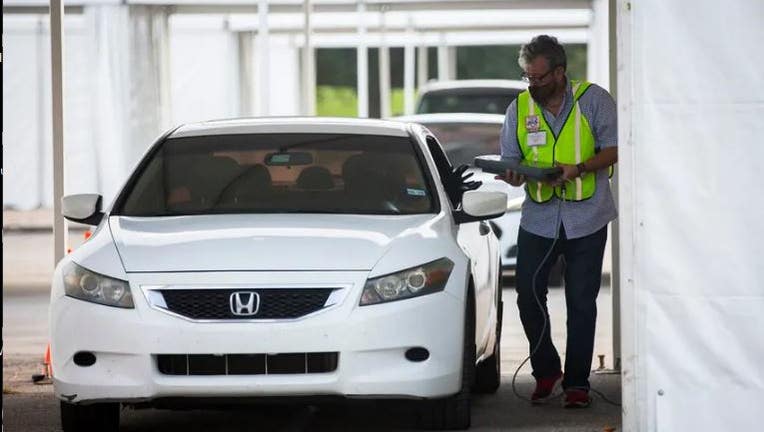Voters in Harris County may continue using drive-thru voting, Texas Supreme Court rules

A voter is handed a machine to vote in the drive-through line at NRG Stadium in Houston during the first day of early voting on Oct. 13, 2020.
Voters in the state's most populous county can continue casting their ballots for the fall election at 10 drive-thru polling places after the Texas Supreme Court Thursday rejected a last-minute challenge by the Texas and Harris County Republican parties, one of many lawsuits in an election season ripe with litigation over voting access.
The court rejected the challenge without an order or opinion, though Justice John Devine dissented from the decision.
In an effort to expand access to voting during the pandemic, Harris County announced in June that it would set up 10 drive-thru polling locations available to all voters, the county clerk's office explained in its filing to the Supreme Court. The county first tested the program with 200 voters in the July primary runoff election. At the locations, lines of cars are guided into either covered tents or a parking garage where poll workers check voters' photo identification and registration status. Voters are handed a portable voting machine in their car to cast they ballot, the clerk’s filing said.
By Wednesday, more than 73,000 people in Harris County had voted at drive-thru polling places, according to the clerk’s early voting totals.
Though the program was publicized for months before the ongoing election, it was not until hours before early voting started last week that the Texas Republican Party and a voter challenged the move in a state appeals court, arguing that drive-thru votes would be illegal. They claimed drive-thru voting is an expansion of curbside voting, and therefore should only be available for disabled voters.
Curbside voting, a long-available option under Texas election law, requires workers at every polling place to deliver onsite curbside ballots to voters who are “physically unable to enter the polling place without personal assistance or likelihood of injuring the voter's health.” Posted signs at polling sites notify voters to ring a bell, call a number or honk to request curbside assistance.
The lawsuit also asked the court to further restrict curbside voting by requiring that voters first fill out applications citing a disability. Such applications are required for mail-in ballots, but voting rights advocates and the Harris County Clerk said they have never been a part of curbside voting.
The Harris County clerk argued its drive-thru locations are separate polling places, distinct from attached curbside spots, and therefore available to all voters. The clerk’s filing to the Supreme Court also said the Texas secretary of state’s Office had approved of drive-thru voting. Keith Ingram, the state’s chief election official, said in a court hearing last month in another lawsuit that drive-thru voting is “a creative approach that is probably okay legally,” according to court transcripts.
After the drive-thru voting lawsuit was first filed by the Texas Republican Party last Monday night, an appeals court in Houston dismissed the case within a day, noting the lawsuit was filed too late on the eve of early voting. The state Republican Party quickly moved to the Supreme Court, and a sister suit was filed by a litigious Houston conservative and the Harris County Republican Party.
The challenge to halt drive-thru and restrict curbside voting was one of many lawsuits filed in federal and state courts by Texas Republican leaders and activists aimed at limiting voting options in the state's most populous, and largely Democratic, county. GOP officials and activists have so far been successful at the Texas Supreme Court by halting the county’s plan to send mail-in ballot applications to all registered voters and holding Texas' strict eligibility requirements during the pandemic on who can cast a ballot by mail. But they lost in trying to limit the early voting period to two weeks after the governor added six more days due to the pandemic.
The Texas Tribune is a nonprofit, nonpartisan media organization that informs Texans — and engages with them — about public policy, politics, government and statewide issues.

